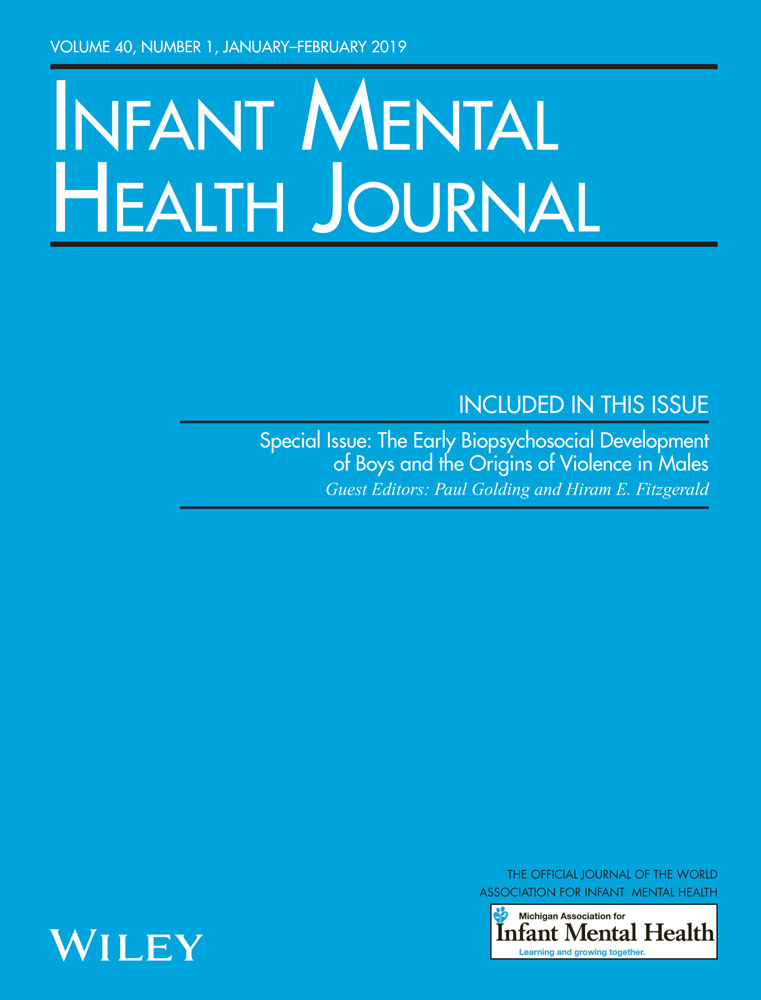The affective basis of violence
[Correction added on 1/10, after first online publication: Change in copyright legal statement.]
ABSTRACT
enViolence is a complex matter, and understandingly perhaps, it is the objective, behavioral aspects that are commonly focused on. Here, however, it is the subjective psychological and especially affective substrates of violence that are brought to the fore. Psychoanalytic perspectives provide a way of thinking about these that also sets them in a human-developmental context. In this essay, psychoanalytic ideas about aggression and violence are considered, and what they have to say about the relationship between states of mind and behavior is critically reviewed. There also is an exploration of the ways that some recent findings in developmental science and neuroscience can refine and augment an understanding of these relationships, facilitating the construction of a psychobiological model, which may be placed in a social context. From this biopsychosocial perspective, aggression is seen as a heuristic concept that encapsulates numerous interacting elements that in ordinary development integrate and serve to promote optimal organism survival: By contrast, from this perspective, in humans violence may be understood as a pathological variant of aggression.
RESUMEN
esLa violencia es un asunto complejo y, comprensivamente quizás, los aspectos sobre los que recae más el enfoque son el objetivo y de conducta. Aquí, sin embargo, son los substratos subjetivo, sicológico y especialmente afectivo de la violencia los que se llevan al primer plano. Las perspectivas sicoanalíticas proveen una manera de pensar acerca de éstos que también los coloca dentro de un contexto humano y de desarrollo. En este ensayo, se consideran ideas sicoanalíticas acerca de la agresión y la violencia y se hace una revisión crítica de lo que ellas tienen que decir sobre la relación entre los estados mentales y el comportamiento.
También se hace una exploración de las maneras como algunas recientes recomendaciones en materia de la ciencia del desarrollo y la neurociencia pueden refinar y aumentar una comprensión de estas relaciones, facilitando así la construcción de un modelo sicobiológico, el cual puede ser colocado dentro de un contexto social. A partir de esta perspectiva sicobiológica, se ve la agresión como un concepto heurístico que encierra numerosos elementos interactivos que en el desarrollo ordinario se integran y sirven para promover la óptima supervivencia del organismo: en contraste, desde esta perspectiva, en los humanos la violencia puede ser entendida como una variante patológica de la agresión.
RÉSUMÉ
frLa violence est une chose complexe et on le comprendra sans doute, ce sont ses aspects objectifs et liés au comportement qui sont le plus souvent l'objet d'attention. Ici, cependant, ce sont ses substrats psychologiques subjectifs et ses substrats affectifs qui sont mis en évidence. Les perspectives psychanalytiques offrent une manière de penser à ses substrats qui les place dans un contexte de développement humain. Dans cet article nous considérons des idées psychanalytiques sur l'agression et la violence et ce qu'elles disent sur la relation entre les états d'esprit le comportement est passé en revue de manière critique. Nous explorons également les manières dont certains résultats dans la science du développement et la neuroscience du développement peuvent redéfinir et accroître la compréhension de ces relations, facilitant la construction d'un modèle psychobiologique, qui peut être placé dans un contexte social. De cette perspective psychobiologique, l'agression est perçue comme un concept heuristique qui encapsule de nombreux éléments interagissant qui dans un développement ordinaire intègrent et servent à promouvoir une survie optimale de l'organisme : en contraste, de cette perspective, chez les humains la violence peut être comprise comme une variante pathologique de l'agression.
ZUSAMMENFASSUNG
deGewalt ist eine komplexe Angelegenheit und vielleicht sind es verständlicherweise die objektiven, verhaltensbezogenen Aspekte, auf die man sich im Allgemeinen konzentriert. Hier stehen jedoch die subjektiven, psychologischen und vor allem affektiven Substrate der Gewalt im Vordergrund. Psychoanalytische Perspektiven bieten eine Denkweise, die sie auch in einen menschlichen Entwicklungskontext einbettet. In diesem Essay werden psychoanalytische Ideen über Aggression und Gewalt betrachtet und kritisch geprüft, was sie über die Beziehung zwischen Geisteszuständen und Verhalten zu sagen haben.
Es wird auch untersucht, wie einige neuere Erkenntnisse der Entwicklungs- und Neurowissenschaften ein Verständnis dieser Zusammenhänge verfeinern und ergänzen können, um den Aufbau eines psychobiologischen Modells zu erleichtern, das in einen sozialen Kontext gestellt werden kann. Aus dieser biopsychosozialen Perspektive wird Aggression als ein heuristisches Konzept betrachtet, das zahlreiche interagierende Elemente zusammenfasst, die in der normalen Entwicklung integriert sind und dazu dienen, das optimale Überleben des Organismus zu fördern: Im Gegensatz dazu kann Gewalt beim Menschen aus dieser Perspektive als pathologische Variante der Aggression verstanden werden.
抄録
ja暴力の情動的基礎
暴力は複雑な事象であり、その客観的行動面に焦点があてられることは無理からぬことかもしれない。しかしここでは、暴力の主観的側面や心理的側面、特に情動的素地に注目してみる。精神分析的視点は、これらを考えかつ人間の発達の脈絡に位置づける方法を提供する。この小論では、攻撃性と暴力についての精神分析的考えを検討し、心の状態と行動の関係を批判的に論評する。
最近の発達科学と脳神経科学のいくつかの知見により、これらの関係性に関する理解を推敲し深める方法の探索がなされている。それは精神生物学的モデルの構成を促進し、社会的脈絡に位置づける。この生物心理社会学的見解から、攻撃性は、多数の相互作用因子を要約し、普通の発展における最適な生物の生存を統合し、促進をもたらすのに役立つ帰納的概念であるとみなされる。対照的に、この観点から人間において暴力は攻撃性からの病的変異と理解できるかもしれない。
摘要
zh暴力的情感基礎
暴力是一個複雜的問題, 也許可能理解的是, 通常關注的是客觀的丶行為方面的問題。然而, 在這裡, 暴力的主觀心理, 特別是情感基礎被提到了前台。精神分析理論提供一種思考這些觀點的方式, 並將這些觀點置於人類發展的背景中。本文考慮關於攻擊行為和暴力的精神分析思想, 並批判評論 它們對心態和行為之關係的看法。本文還探討發展科學和神經科學的一些最新發現, 以改進和增強對這些關係的理解, 促進可能會被放置在社會背景中, 心理生物學模型的構建。從這種生物心理社會的角度來看, 攻擊行為被視為一種啟發式概念, 它包含了許多相互作用的元素, 這些元素在普通的發展中, 融合併有助於促進最佳的有機體生存:相比之下, 從這個角度來看, 人類暴力可以被理解為攻擊行為的病態變體。
ملخص
arالأساس الوجداني للعنف
العنف مفهوم معقد عادة ما نشير إليه على أنه يمثل الجوانب الموضوعية والسلوكية محل التركيز. ولكننا في هذا البحث نبرز الركائز الذاتية السيكولوجية والعاطفية للعنف. وتقدم وجهات النظر التحليلية النفسانية منهج للتفكير في هذه الطرق وتضعها أيضا في سياق النمو البشري. في هذا المقال نتناول نظريات التحليل النفسي عن العدوانية والعنف وما ينطوى على هذه النظريات حول العلاقة بين الحالات العقلية والسلوك ونقدم مراجعة نقدية موضوعية لهذه الأفكار. كما نستعرض الطرق التي يمكن لنتائج علوم النمو وعلم الأعصاب أن تزيد من فهمنا لهذه العلاقات ، وتسهيل بناء نموذج بيوسيكولوجي ، والذي يمكن وضعه في سياق اجتماعي. ومن هذا المنظور البيولوجي السيكولوجي الاجتماعي ، نعتبر العدوانية مفهوما إرشاديا يضم العديد من العناصر المتفاعلة التي تتكامل فيما بينها في الإطار الطبيعي للنمو وتعمل علي تعزيز البقاء الأمثل للكائنات الحية: ومن جانب آخر ومن هذا المنظور ، يمكن ان يفهم العنف البشري علي انه أحد الأشكال المرضية للعدوانية.
CONFLICT OF INTEREST
There are no conflicts of interest.




